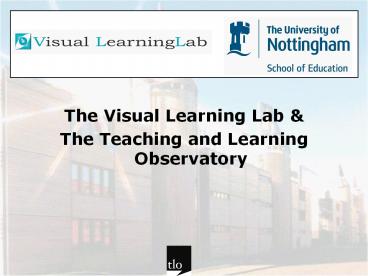The Visual Learning Lab - PowerPoint PPT Presentation
1 / 18
Title:
The Visual Learning Lab
Description:
The Visual Learning Lab & The Teaching and Learning Observatory – PowerPoint PPT presentation
Number of Views:92
Avg rating:3.0/5.0
Title: The Visual Learning Lab
1
- The Visual Learning Lab
- The Teaching and Learning Observatory
2
- The VLL Co-directors
- Dr Do Coyle Education, LSRI
- Prof. Roger Murphy Education, LSRI
3
- The VLL includes partners from
- Education
- Computer Science
- Geography
- Chemical Environmental Engineering
- Medical School
- Nursing
- Clinical Laboratory Sciences
- Psychology
4
- Why the focus on visual learning?
- Visual perception is a vital part of learning,
however, this is not taken into account
sufficiently in academic learning - Visual learning promotes student and tutor
interaction with visual phenomena - The VLL aims to exploit and develop the strengths
of visual learning across academic subject and
research areas
5
- The Teaching and Learning Observatory
- established in School of Education since 1999
- enables live observations of classrooms from TLO
room/s - Used in a range of ways ITE, CPD, research
6
- The TLO in action
7
- The Teaching and Learning Observatory
8
- The Teaching and Learning Observatory - some
examples - TLO lesson observation
- TLO teaching
- Pupils views
- Students views
- Trainers views
9
- The Teaching and Learning Observatory
- Uses for ITE
- Guided TLO lesson observations by students
- Remote teaching
- Remote lesson observations by tutors
10
- The Teaching and Learning Observatory
- Uses for CPD
- Staff development conferences (e.g. English,
Science) - Individual Teacher Development and Support for MA
studies
11
- The Teaching and Learning Observatory
- Uses for learners
- Developing cooperatively creative stories, e.g.
soap opera production - Learner conferences, e.g. topic-based discussions
12
- Theorising the TLO Supporting the building of
the knowledge society - In the knowledge society, teachers will have to
- Promote deep cognitive learning
- Learn to teach in ways they were not taught
- Commit to professional learning
- Work and learn in collegial teams
- Treat parents/children as partners in learning
- Develop and draw on collective intelligence
- Build a capacity for change risk
- (Andy Hargreaves, 2003)
13
- Theorising the TLO Building knowledge for and
with learners and teachers - Communal constructivism.
- is an approach to learning in which students
teachers not only construct their own knowledge
(ie constructivism) as a result of interacting in
their environment (social constructivism) but are
also actively engaged in the process of
constructing knowledge for their learning
community (communal). - (Holmes, 2001)
14
- Theorising TLO interactions LOCIT
- (Lesson observation critical incident
technique) - Agree focus (teacher-led)
- Lesson Observation cycle via TLO
- Critical Incident Technique applied
(researcher-led) - Incident analysis (researcher led)
- Teacher/researcher discussion of CIs (post
selection - teacher confirmation and exploration) - Focus renewal cycle recommences
15
- Theorising TLO interactions LOCIM
- (Lesson observation, critical incident mediation)
- Agree focus (teacher-led)
- Lesson Observation cycle via TLO
- Critical Incident Technique applied (researcher
teacher) - Incident analysis (researcher teacher )
- Teacher/researcher exploration of CIs
- Understanding events-reconceptualising
- Focus renewal and future planning for inclusivity
- cycle recommences
16
- Theorising TLO interactions LOCUS
- (Lesson observation and critical understanding
spaces) - Agree focus (teacher/learner/researcher led)
- Lesson Observation cycle via TLO
- Critical Incident Technique applied
(teacher/researcher) - Joint comparison and analysis- the learning zone
- Feedback to learners- analysis with learners
interpretation creating an inclusive learning
zone - Focus renewal (teachers learners)
- Future planning rooted in transformative pedagogy
17
- Theorising TLO interactions
- In summary, the TLO helps to
- create communities of practice (Holmes, 2001)
- develop theories of practice (van Lier, 1996)
- explore postmethod pedagogies (Kumaradivelu,
2001)
18
- Thank you!
- Contact details for the TLO
- Dr Do Coyle Dr Rolf Wiesemes
- E-mailrolf.wiesemes_at_nottingham.ac.uk
- http//www.nottingham.ac.uk/education/tlo
- Contact details for the Visual Learning Lab
- Dr Do Coyle, Prof. Roger Murphy, Dr Rolf Wiesemes
- E-mailrolf.wiesemes_at_nottingham.ac.uk
- http//www.visuallearninglab.ac.uk































